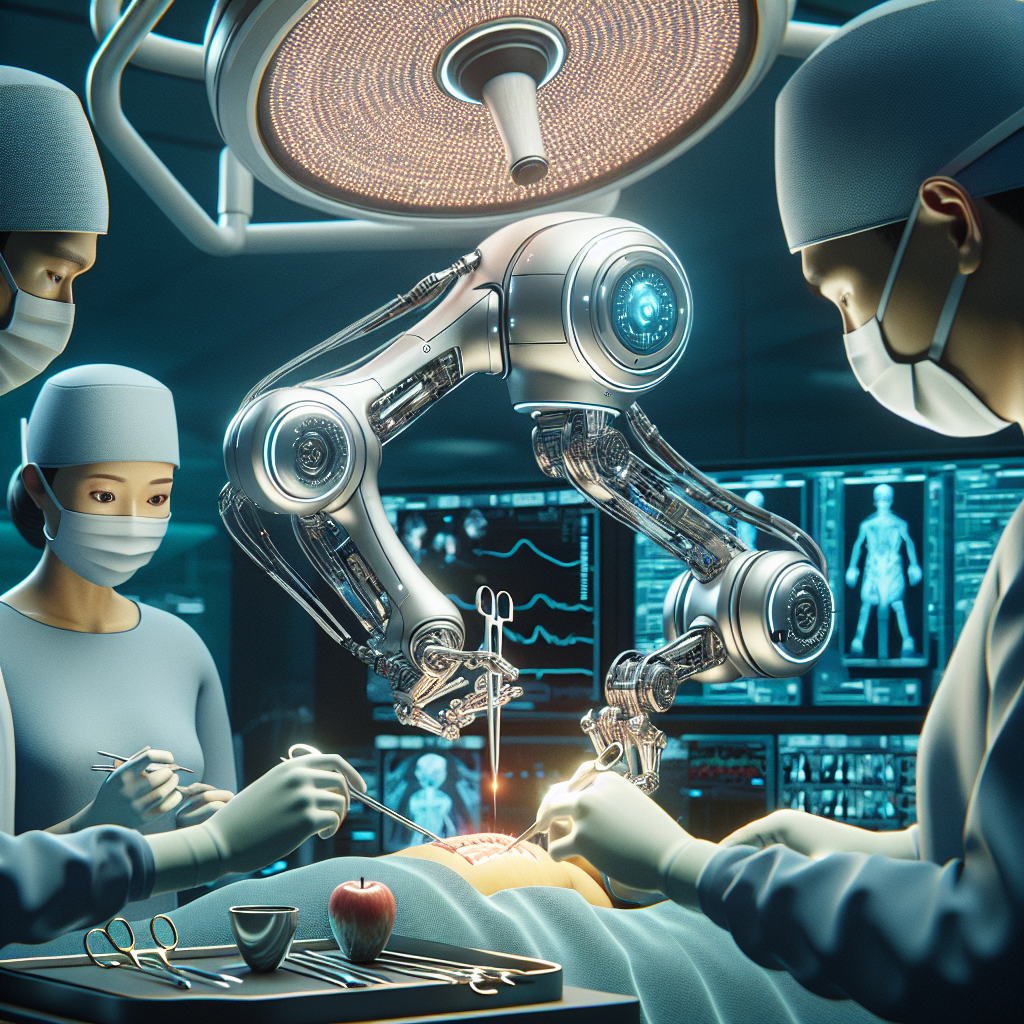In the realm of healthcare, the incredible potential of Artificial Intelligence (AI) is being harnessed to revolutionize patient care and medical practices. This article explores the varied ways in which AI is utilized in the healthcare industry, from diagnosing diseases with astonishing accuracy to predicting patient outcomes and optimizing treatment plans. With AI at the forefront, healthcare professionals are empowered to provide more efficient, personalized, and proactive care, leading to improved patient outcomes and a brighter future for healthcare as a whole. So, let’s embark on this fascinating journey to uncover the ways AI is transforming the world of healthcare.

Improving Diagnosis and Treatment
Automated Diagnosis Systems
Automated diagnosis systems, powered by artificial intelligence (AI), are revolutionizing the field of medicine by providing faster and more accurate diagnoses. These systems analyze large amounts of patient data, including medical history, symptoms, and test results, to assist healthcare professionals in diagnosing various diseases and conditions. By integrating AI algorithms and machine learning models, these systems continuously learn and improve their diagnostic capabilities, ensuring better outcomes for patients.
Precision Medicine
Precision medicine aims to deliver tailored healthcare solutions based on an individual’s genetic, environmental, and lifestyle factors. AI plays a crucial role in this field by analyzing vast amounts of genomic data to identify specific genetic variations that may impact an individual’s response to certain treatments. By leveraging AI algorithms, healthcare providers can better predict disease risks, determine optimal treatment options, and customize medication plans for individual patients, leading to more successful treatment outcomes.
Personalized Treatment Plans
Based on the principles of precision medicine, personalized treatment plans utilize AI to create tailored healthcare strategies for each patient. AI algorithms analyze patient data, including genetic information, medical history, and lifestyle factors, to identify the most effective treatments and predict potential adverse reactions. By considering individual variations, personalized treatment plans can optimize the efficacy of interventions, reduce side effects, and improve overall patient outcomes.
Enhancing Patient Care
Virtual Health Assistants
Virtual health assistants leverage AI technology to provide personalized guidance and support for patients, especially those with chronic conditions. These digital assistants can answer questions, provide medication reminders, offer dietary recommendations, and track vital signs, ensuring patients receive consistent, evidence-based care. Virtual health assistants also have the potential to improve patient engagement and adherence to treatment plans, leading to better overall health outcomes and reduced healthcare costs.
Remote Patient Monitoring
Remote patient monitoring enables healthcare providers to track and monitor patients’ health conditions outside of traditional clinical settings. AI-powered devices, such as wearable sensors and smartphones, collect real-time data on vital signs, symptoms, and medication adherence, which is then analyzed to detect any abnormalities or trends. The use of AI in remote patient monitoring facilitates early intervention, reduces hospital readmissions, and enhances patient self-management, empowering individuals to take a more active role in their healthcare.
Medication Management
AI-supported medication management systems help healthcare providers optimize the prescription and administration process, minimizing medication errors and improving patient safety. These systems use AI algorithms to cross-reference a patient’s medical history, allergies, and current medications to ensure appropriate dosage and prevent harmful interactions. Additionally, AI can assist in monitoring medication adherence, reminding patients to take their medications, and providing educational resources regarding potential side effects and drug interactions.
Streamlining Administrative Tasks
Automated Documentation and Coding
AI-powered systems can streamline administrative tasks by automating documentation and coding processes. Natural language processing technology enables these systems to analyze clinical notes and medical records, extracting relevant information and generating accurate codes for diagnoses, procedures, and billing purposes. By reducing the burden of manual documentation, healthcare providers can save time, improve accuracy, and allocate more resources to patient care.
Appointment Scheduling and Management
AI-driven appointment scheduling and management systems enhance the efficiency and convenience of healthcare services. These systems employ machine learning algorithms to analyze patient preferences, availability, and historical appointment patterns to schedule appointments that align with both patient and provider schedules. By automating this process, healthcare facilities can optimize patient flow, minimize waiting times, and improve overall patient satisfaction.
Billing and Claims Management
AI technology improves the accuracy and efficiency of billing and claims management in the healthcare industry. By automating the coding and documentation processes, AI systems can detect potential errors and discrepancies, reducing the chances of claim denials and delays in reimbursement. Machine learning algorithms can also help identify patterns of fraudulent activities, improving fraud detection and prevention measures. By streamlining billing processes, healthcare organizations can enhance revenue management and financial stability.
Enabling Medical Image Analysis
Radiology and Imaging
AI is transforming the field of radiology and medical imaging by enabling more accurate and efficient analysis of medical images, such as X-rays, MRIs, and CT scans. Deep learning algorithms can automatically detect and highlight abnormalities, assisting radiologists in the diagnosis and interpretation of these images. By reducing interpretation errors and providing quantitative measurements, AI technology enhances the speed and reliability of radiological diagnoses, ultimately improving patient outcomes.
Pathology
In pathology, AI algorithms aid in the analysis of tissue samples and the detection of diseases, such as cancer. Using image recognition and pattern recognition methods, AI systems can identify abnormal cells or tissue structures with high precision and efficiency. These systems not only assist pathologists in making accurate diagnoses but also enable the evaluation of disease progression, prediction of treatment response, and identification of potential therapeutic targets. AI-based pathology solutions help optimize workflow, reduce turnaround times, and enhance the quality of patient care.
Ophthalmology
AI has found significant applications in ophthalmology, particularly in the identification and diagnosis of eye diseases. Deep learning algorithms can analyze retinal images to detect abnormalities associated with conditions such as diabetic retinopathy, glaucoma, and age-related macular degeneration. By providing accurate and timely diagnoses, AI-powered ophthalmology systems enable early intervention, prevent vision loss, and improve the overall management of eye diseases.

Facilitating Drug Discovery
Target Identification and Validation
AI techniques assist in identifying and validating potential drug targets, which are specific molecules or processes involved in disease progression. By analyzing large datasets, including genomic data, molecular structures, and clinical data, AI algorithms can identify target candidates with high precision. This accelerates the drug discovery process by providing valuable insights into the mechanisms of diseases and their potential therapeutic targets, paving the way for the development of new and effective treatments.
Virtual Screening and Predictive Modeling
Virtual screening, powered by AI, expedites the identification of promising drug candidates by analyzing chemical libraries and predicting their interactions with target molecules. AI algorithms simulate molecular interactions, predict drug-receptor binding affinities, and assess the potential efficacy and safety of candidate drugs. This enables researchers to prioritize the most promising compounds for further experimental validation, significantly reducing the time and cost associated with traditional drug discovery approaches.
Clinical Trial Optimization
AI plays a crucial role in optimizing clinical trials, from patient recruitment to data analysis. By leveraging machine learning algorithms, AI systems can identify eligible patients for specific trials based on their medical records, genetic profiles, and other relevant data. AI algorithms can also help optimize trial protocols, predicting patient outcomes, and identifying potential risks or adverse events. By streamlining trial processes and making them more efficient, AI enhances the discovery and development of new drugs, ultimately benefiting patients and accelerating the delivery of innovative treatments.
Supporting Mental Health Monitoring
Emotion Recognition
AI technology enables the recognition and analysis of facial expressions, vocal patterns, and physiological signals to assess an individual’s emotional state. Emotion recognition systems can assist mental health professionals in monitoring changes in a patient’s emotional well-being, facilitating early intervention and personalized treatment plans. By providing objective and quantifiable data on emotional responses, AI-based systems help improve the accuracy and efficiency of mental health assessment.
Chatbots for Therapy
AI-powered chatbot systems are being used to provide mental health support and therapy to individuals in need. These chatbots utilize natural language processing techniques to engage in dialogue with users, offering emotional support, psychoeducation, and coping strategies. While chatbots cannot replace human therapists, they can provide accessible and non-judgmental support around the clock, especially in underserved communities. AI chatbots for therapy have the potential to improve mental health outcomes, reduce stigmatization, and bridge the treatment gap.
Predictive Analytics
By analyzing a wide range of data, including electronic health records, social media activity, and smartphone usage patterns, AI algorithms can predict the onset or relapse of mental health conditions. Predictive analytics models can identify patterns and risk factors that may contribute to mental health challenges, enabling healthcare professionals to intervene proactively. This early intervention can prevent the worsening of symptoms, reduce hospitalizations, and enhance the overall management of mental health conditions.
Preventing Medical Errors
Early Warning Systems
AI-based early warning systems continuously monitor patient data, such as vital signs, lab results, and medication administration records, to identify potential signs of deterioration or adverse events. By comparing real-time data to established thresholds and patterns, these systems can alert healthcare providers to intervene promptly and prevent medical errors. Early warning systems powered by AI technology minimize the risk of complications, improve patient safety, and ultimately save lives.
Real-Time Monitoring
Real-time monitoring, enabled by AI, allows healthcare professionals to track patient conditions and responses continuously. AI algorithms analyze data from various sources, including wearable devices and medical sensors, to provide real-time insights into patients’ physiological parameters and overall health status. Real-time monitoring helps identify deviations from baseline values, enabling early intervention and timely adjustment of treatment plans. With the aid of AI, healthcare providers can ensure patient safety and optimize clinical outcomes.
Decision Support Systems
AI-powered decision support systems provide healthcare professionals with evidence-based recommendations and assist in making accurate clinical decisions. By analyzing vast amounts of medical literature, research studies, and patient data, these systems can suggest treatment options, drug dosages, and diagnostic pathways. Decision support systems reduce the risk of errors due to cognitive biases or incomplete information, improving the quality of care and clinical outcomes.
Improving Hospital Workflow
Patient Flow Management
AI facilitates efficient patient flow management within hospitals by optimizing bed assignments, scheduling procedures, and coordinating transfers. AI algorithms analyze real-time data on bed availability, patient acuity, and resource allocation to ensure patients are allocated to appropriate beds, reducing wait times and optimizing resource utilization. By improving hospital workflow and patient throughput, AI helps enhance the efficiency and quality of care delivery.
Resource Allocation
AI technology assists healthcare organizations in optimizing resource allocation, including staff, equipment, and supplies. By analyzing historical data, patient census, and operational constraints, AI algorithms can predict resource demand and facilitate proactive planning and management. This ensures that resources are allocated efficiently, reducing bottlenecks, enhancing patient care, and minimizing waste.
Staffing Optimization
AI algorithms help healthcare providers optimize staffing levels to meet patient needs while ensuring cost-effectiveness. By analyzing historical patient data, seasonal patterns, and staff preferences, AI-based solutions can generate staffing schedules that align with patient demand. By optimizing staffing levels, healthcare organizations can improve patient satisfaction, reduce staff burnout, and enhance overall care quality.
Empowering Health Research
Data Analysis and Insights
AI enables researchers to analyze large and complex datasets, extracting meaningful insights and accelerating medical discoveries. By utilizing machine learning algorithms, AI systems can identify patterns, correlations, and hidden relationships within vast amounts of data, supporting researchers in areas such as disease surveillance, public health monitoring, and drug discovery. AI-powered data analysis assists in generating research hypotheses, guiding experimental design, and improving the understanding of various health phenomena.
Genomic Research
Genomic research benefits from AI technology by analyzing and interpreting vast amounts of genetic data to reveal insights into disease mechanisms and potential therapeutic targets. AI algorithms can identify genetic variations associated with disease susceptibility, drug response, and treatment outcomes, enabling researchers to develop personalized interventions. By combining AI and genomic research, scientists can achieve breakthroughs in precision medicine and drive advancements in understanding genetic diseases.
Epidemiology Studies
AI contributes to epidemiology studies by analyzing population-level data to identify disease patterns, risk factors, and trends. Machine learning algorithms can analyze electronic health records, claims data, and social media data to detect disease outbreaks, monitor the spread of infectious diseases, and predict disease progression. AI-powered epidemiological research enhances our understanding of disease dynamics, supporting public health interventions, and resource allocation.
Enhancing Telemedicine
Teleconsultation and Telemonitoring
AI enhances telemedicine by enabling remote consultations and continuous monitoring of patients’ health conditions. AI algorithms can analyze patient data, including vital signs, symptoms, and medical history, and provide real-time insights to healthcare providers during teleconsultations. Additionally, telemonitoring devices, powered by AI, can collect and transmit patient data to healthcare professionals, facilitating remote monitoring and timely intervention. AI-driven telemedicine enables accessible and convenient healthcare delivery, especially for individuals in remote areas or with limited access to traditional healthcare facilities.
Telepathology
Telepathology leverages AI to enable remote access and analysis of pathological specimens. By digitizing microscopic images, AI algorithms can assist pathologists in making accurate diagnoses remotely. AI-powered telepathology enhances access to specialized pathology expertise, especially in underserved regions, and facilitates timely diagnoses, leading to improved patient care and reduced delays in treatment.
Telepsychiatry
AI-supported telepsychiatry provides remote mental health services, including assessments, consultations, and therapy sessions. By leveraging AI chatbots and speech recognition technology, telepsychiatry platforms can assist in gathering relevant patient information, identifying symptoms, and providing initial support. AI-driven telepsychiatry improves access to mental healthcare, reduces barriers, and enhances the overall well-being of individuals who may struggle to seek in-person services.
In conclusion, AI technologies are transforming various aspects of healthcare, revolutionizing diagnosis and treatment, enhancing patient care, optimizing administrative tasks, enabling medical image analysis, supporting drug discovery, monitoring mental health, preventing medical errors, improving hospital workflow, empowering health research, and enhancing telemedicine services. With continued advancements in AI, healthcare is set to become more personalized, efficient, and effective, ultimately benefiting patients worldwide.
